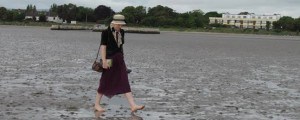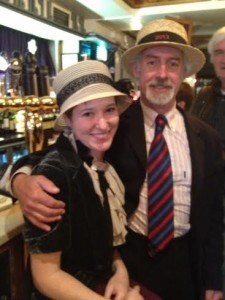an Account of Bloomsday 2013, Dublin
a short memoir by Becky Boncal

Becky Boncal retraces the steps of Stephen Dedalus on Sandymount Strand. Photo by Brandan Cadran.
I went to Dublin as a writer, a tourist, a teacher with twenty-four college students who understood, through a series of lectures I gave before the trip, that this was, for me, a holy pilgrimage. A cooler June than that of 1904 when Nora first walked out with James, when Dignam was buried, and Dedalus was taken in by Bloom. During our four days in Dublin, we wore our legs sore walking between museums, parks, and theatres. Now and then, my students and I dipped into dusty little bookshops hidden at the tops of winding stairs, and I debated whether or not to buy another copy of Ulysses. I had three on my shelves back home—left there when I decided to download it to my iPad and leave room in my suitcase for the books I would bring back from Ireland. But the iPad, I realized, stepping into line in the bookshop, would not compliment my Bloomsday costume.
“The book opens at 8:00 a.m. tomorrow,” I told the students before I let them loose in Temple Bar for the night. The walk to the DART station would take fifteen minutes and the ride out to the museum at Martello Tower about twenty, so if they wanted to join me, they had to be in the lobby by of the hostel by 7:30 a.m. (I’d promised extra credit to anyone in my class willing to wear a t-shirt printed with the words Worst Man in Dublin.) Bloomsday would be our last day in Dublin before we took a bus to Galway—the students’ only free day in the city—and I was under no illusions about their commitment to my plans. I was actually looking forward to walking alone to the station in my velvet jacket, ruffled blouse, gauzy skirt, and straw cloche hat, gazing out the windows of the train with the book open on my lap, but I was surprised the next morning to find seven teenagers dressed in jeans and parkas waiting for me in the lobby, cameras strapped around their necks.
Though I’d assigned only Dubliners and Portrait as required reading in my 20th Century Irish Literature course, I’d taught them the novel’s inside jokes—What is home without Pumbtree’s Potted Meat? Incomplete!— showed them old maps of Dublin, (on Nabokov’s advice) marking out the characters’ paths. The word “beach” had enticed a few of them who were not in my literature class to join us, though, as we paraded through the empty city streets, my legs cold in the wet morning air, the sky grey and weepy, I worried I had overbuilt their expectations.
My worry turned to certainty when we found the gate at the DART station padlocked. No Sandymount tram. It was a Sunday, and in all my months of planning, it had not occurred to me that public transportation might be shut down (not on his day!). Even the bus station was closed. The students huddled on a corner amid the closed up shops, rubbing their arms in the chilly air, looking just sorry enough for me not to be irritated at having woken up so early for nothing, when I spotted a taxi. I flagged the driver and asked if he might call a second cab to shuttle out group out to Sandymount.
The strand glimmered silver outside one window as a crammed row of colorful cottages dipped up and down in the other. At a roundabout, in a quaint, unassuming beach neighborhood, the tower appeared from behind the trees—Kinch ahoy!
“Looks closed,” the Bahamian cab driver said as we pulled up.
It was smaller than I’d imagined and partially surrounded, I realized with an ache in my heart, by a moat of orange cones and a chain link fence where a sign was posted.
No Hat
No Boots
No Job.
Posted nearby was a picture of the planned renovation. A description of the project said it was to be completed by next year. I stood starting at the heavy, locked door of the tower.
At the foot of the ladder Buck Mulligan asked:
—Did you bring the key?
My students were quick to recover from their disappointment, rushing from the cabs to the beach. I asked the drivers to return for us in an hour. The only other people around were joggers and dog walkers in sweats, some of whom waved at me or nodded, or looked the other way. My students took pictures of each other looking contemplative or dancing around in the cold, shallow water as I walked along the shore, Mary Janes under my arm, staring to the distance beyond the factories, imagining the view as it had been in 1904.
End of excerpt. Read this essay in its entirety here.

Becky Boncal with John Joyce, grand-nephew of James Joyce, in Davy Byrnes Pub in Dublin, photo by Nicole Joyce
Becky Boncal is a graduate of the MFA program at George Mason University. She teaches writing at John Tyler Community College and at The Visual Arts Center in Richmond, VA. Her fiction, poetry, and essays have appeared in The Copperfield Review, The Menda City Review, Everyday Genius, Hoot, and The Buried Letter Press. She was chosen as a finalist for the 2013 Fulton Prize in Fiction for her story published in The Adirondack Review.